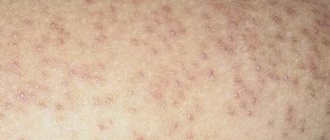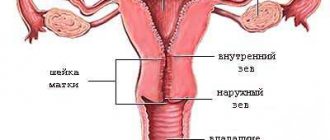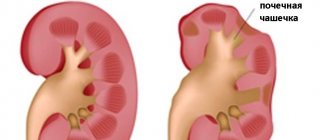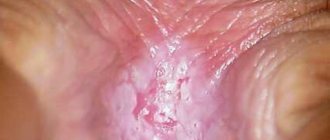Kraurosis of the vulva is a pathology characterized by dystrophic changes in the skin and mucous membrane of the external genitalia. The problem often appears due to the natural aging of the body or disrupted processes of the endocrine system.
Some doctors consider kraurosis to be one of the types of lichen sclerosus. However, most scientists are against such a classification, since dystrophic changes have specific symptoms. Moreover, processes leading to oncology often occur in the affected tissue. That is why the disease is considered a precancerous condition.
Etiology
A number of external and internal factors contribute to the development of pathology:
- Hypofunction of the thyroid gland, ovaries, adrenal cortex;
- Traumatic brain injuries leading to inflammation or other disorders of the pituitary gland and hypothalamus;
- Surgical interventions associated with the removal of parts or entire organs of the genitourinary system;
- Violation of bioelectrical activity of the brain;
- Short reproductive period (refusal of sexual activity);
- Lack of pregnancy, childbirth;
- Obesity;
- Diabetes;
- Frequent sexually transmitted infections;
- Traumatization of the external genitalia;
- Chronic inflammatory processes of the genitals.
Doctors often observe the appearance of stress, depression, and other psycho-emotional disorders in a patient against the background of developing symptoms of kraurosis.
If the body is severely affected, several systemic diseases develop at once; kraurosis of the vulva is possible in women of reproductive age: from 30 years.
Prognosis for kraurosis of the vulva
Kraurosis of the vulva is a PRIMARY CHRONIC DISEASE with an imperceptible period of formation and a long course.
In most cases, kraurosis of the vulva is incurable and SLOWLY PROGRESSES throughout life, BECAUSE most women categorically DO NOT WANT TO RETHINK themselves and look at life and themselves in this life in a new way.
Based on our long and successful experience in the treatment of kraurosis, after eliminating the causes of kraurosis formation and adequate comprehensive treatment, it is POSSIBLE to achieve and MAINTAIN a state of stable remission (a state WITHOUT COMPLAINTS and subjective changes).
Symptoms and classification
Signs of pathology depend on the stage of the lesion:
- First. It is characterized by initial disturbances in blood supply and changes in the skin. The patient notices a slight tingling sensation in the perineal area. Possible swelling and redness. Then there is a burning sensation and itching. Sometimes during sexual arousal, lubrication is completely or partially absent.
- Second. The damaged tissue thickens and becomes keratinized. Pigment spots appear and the skin peels off. The labia majora, clitoris, and labia minora gradually become deformed. Burning and itching become intolerable and intensify after intimacy or personal intimate hygiene procedures. Working capacity is impaired, even in a calm state the woman does not find peace. Scratching and bruising appear in the perineum.
- Third. Complete atrophy of the labia, they resemble dense ridges, there is no anatomical distinction. The vestibule of the vagina decreases, sometimes complete fusion and obliteration occur.
Already at the second stage, a woman’s intimate life becomes impossible. Because of this, problems in the emotional sphere develop even more.
Leading doctors in the treatment of vulvar hyperkeratosis in women of the Southern Federal District
Ermolaeva Elvira Kadirovna A well-known and recognized specialist in the North Caucasus in the field of diagnosis and treatment of kraurosis, leukoplakia, vulvar hyperkeratosis, lichen sclerosus, Keir's erythroplasia and other diseases of the vulva. A good gynecologist, physiotherapist-resortologist, ultrasound doctor. Desperate and exhausted women turn to her .
Ermolaev Oleg Yuryevich Candidate of Medical Sciences, gynecologist-endocrinologist with 25 years of experience and successful experience in the treatment of kraurosis, leukoplakia and vulvar hyperkeratosis. Able to see relationships that elude others.
About the doctors of the Clinic in detail...
| INTERNATIONAL RECOGNITION of the reputation and achievements of the Women's Health Resort Clinic in the development and implementation of effective and safe treatment methods and the quality of medical services provided is the AWARDING of the Women's Health Resort Clinic in Pyatigorsk with the SIQS International QUALITY CERTIFICATE in the field of medicine and healthcare. International Socratic Committee, Oxford, UK and Swiss Institute for Quality Standards, Zurich, SWITZERLAND. |
The resort clinic for women's health operates on a paid basis and in the voluntary health insurance system.
Each doctor at the Clinic has long-term experience, several specializations and is able to comprehensively assess the situation.
The resort women's health clinic is open 7 days a week and on holidays:
Monday - Friday from 8.00 to 20.00, Saturday, Sunday, holidays from 8.00 to 17.00.
Treatment in Pyatigorsk by appointment no later than 3 days in advance by multi-channel phone number 8 (800) 500-52-74 (calls within Russia are free), or +7 (for international calls).
| ASK ONLINE about the treatment of hyperkeratosis at REGISTER ONLINE for the treatment of hyperkeratosis here. REGISTER online for the treatment of hyperkeratosis here. You can buy coursework for treatment by phone or here. |
Booking
The doctors of the Women's Health Resort Clinic have gained a LOT of successful EXPERIENCE in treating hyperkeratosis with natural medicines and resort factors.
We accept women from all cities of Russia, near and far abroad.
The spa clinic for women's health facilitates the accommodation and accommodation of women, women with children and couples during examination and treatment.
ACCOMMODATION in Pyatigorsk IS NOT INCLUDED IN THE PRICE of the course of treatment for vulvar hyperkeratosis and is paid separately.
About living conditions and transfer from Mineralnye Vody airport and Pyatigorsk railway station in detail in the article “Accommodation”.
If you need to book accommodation, please coordinate your arrival date no later than 7 days in advance.
We are AT YOUR FULL DISPOSAL if you have any doubts or wishes.
- About the Clinic
- Clinic team
- Reviews about treatment in our Clinic
- What is homeopathy?
- How to prepare for an appointment with a gynecologist?
The resort women's health clinic is open 7 days a week and on holidays:
Monday - Friday from 8.00 to 20.00, Saturday, Sunday, holidays from 8.00 to 17.00.
Treatment by appointment via multi-channel telephone number 8 (calls within Russia are free), or (for foreign calls).
| BOOK ONLINE for treatment here. BOOK online for treatment here. Buy coursework for treatment by phone or here. |
Booking a course
Subsections
- Program No. 1. Treatment of inflammatory and infectious diseases of the pelvis
- Program No. 2. Treatment of urinary incontinence, treatment of uterine and vaginal prolapse
- Program No. 3. Treatment of female infertility
- Program No. 4. Cervical treatment
- Program No. 5. Treatment of uterine fibroids
- Program No. 6. Treatment of cervicitis and endocervicitis
- Program No. 7. Recovery after childbirth and narrowing of the vagina
- Program No. 8. Treatment of chronic cystitis
- Program No. 9. Treatment of menopause
- Program No. 10. Treatment of mastopathy
- Program No. 11. Treatment of endometriosis
- Program No. 12. Treatment of hydrosalpinx
- Program No. 14. Treatment of polycystic ovary syndrome
- Program No. 15. Preparation for IVF, ICSI, artificial insemination
- Program No. 16. How to remove belly fat
- Program No. 17. Treatment of kraurosis
- Program No. 18. Treatment of vulvar leukoplakia
- Program No. 19. Prevention of mastopathy
Diagnostics
At the initial stage, kraurosis of the vulva is determined only with the help of instrumental diagnostics: with colposcopy, which magnifies the image being examined several tens of times. If the pathology is already well developed, an experienced gynecologist will notice changes already when examining the patient in the chair.
For additional research, doctors prescribe:
- Smears for cytology. A common event when visiting a gynecologist. However, in this case it is considered mandatory, since it helps to determine the onset of oncology development.
- PCR test for detecting HPV (Human Papilloma Virus) and other pathogens.
- General, biochemical blood tests, glucose level measurement. Determine hormonal levels and blood quality. Helps identify the cause of pathology at an early stage.
- Urine tests. Indicate infectious processes in the body, disrupted metabolic processes.
- Histology of particles of affected areas of skin and mucous membranes. Required to detect cancerous or mutated cells.
It is important to differentiate the disease from vaginitis, neurodermatitis and other pathologies in time.
Our doctors
General Director Anshina Margarita Beniaminovna Make an appointment
Director of the Rizhinashvili clinic Semyon Iosifovich Make an appointment
Obstetrician-gynecologist-reproductologist Zhordanidze Diana Omarovna Make an appointment
Obstetrician-gynecologist-reproductologist Torchinov Aslanbek Ruslanovich Make an appointment
Obstetrician-gynecologist, reproductive specialist. Efimova Maria Sergeevna Make an appointment
Obstetrician-gynecologist, reproductive specialist Khubonshoeva Leila Yuryevna Make an appointment
Obstetrician-gynecologist-reproductologist Anna Sergeevna Fedorova Make an appointment
Obstetrician-gynecologist, reproductive specialist Shagunova Marina Olegovna Make an appointment
Obstetrician-gynecologist Samoilova Tatyana Evgenievna Make an appointment
Urologist-andrologist of the highest qualification category Gablia Mikhail Yurievich Make an appointment
Obstetrician-gynecologist-endocrinologist Sharyafetdinova Failya Abdulkhaevna Make an appointment
Obstetrician-gynecologist Pushkina Valeria Vadimovna Make an appointment
Obstetrician-gynecologist Margarita Yuryevna Skvortsova Make an appointment
Obstetrician-gynecologist Slobodchikova Valeria Yuryevna Make an appointment
Obstetrician-gynecologist Peskova Irina Evgenievna Make an appointment
Perinatologist Nelly Idrisovna Kokhno Make an appointment
Obstetrician-gynecologist Olga Borisovna Kuharkina Make an appointment
Obstetrician-gynecologist Pitskhelauri Elena Germanovna Make an appointment
Obstetrician-gynecologist Abdullaeva Adilya Akhmadovna Make an appointment
Hemostasiologist Lopukhin Vadim Olegovich Make an appointment
Oncologist-mammologist Victoria Borisovna Akimova Make an appointment
Ultrasound diagnostics doctor Olga Ivanovna Babaeva Make an appointment
Ultrasound diagnostics doctor Brilliantova Nadezhda Nikolaevna Make an appointment
Ultrasound diagnostics doctor Natalya Sergeevna Gorovaya Make an appointment
Vascular ultrasound diagnostics doctor, vascular surgeon Anna Mikhailovna Nikitina Make an appointment
Cardiologist Maria Viktorovna Cherkasova Make an appointment
Endocrinologist Anzhelika Vladimirovna Manovitskaya Make an appointment
Gastroenterologist Golysheva Svetlana Valerievna Make an appointment
Obstetrician-gynecologist-reproductologist Olga Aleksandrovna Iskorostinskaya Make an appointment
Urologist-andrologist Iskorostinsky Evgeniy Vladimirovich Make an appointment
Psychologist Barskaya Ekaterina Sergeevna Make an appointment
Therapist Alexandra Vladimirovna Kabakova Make an appointment
Anesthesiologist-reanimatologist Isaev Oleg Vladimirovich Make an appointment
Psychiatrist, sexologist Teona Otarievna Kacharava Make an appointment
Head of the Embryology Laboratory. Ph.D. Sergeev Sergey Alexandrovich Make an appointment
Embryologist Kalinina Irina Ivanovna Make an appointment
Embryologist Kalyuzhny Sergey Andreevich Make an appointment
Embryologist Matveeva Elona Olegovna Make an appointment
Embryologist Vladimir Viktorovich Ovsyankin Make an appointment
Treatment
Kraurosis of the vulva, especially in the second or third stage, is difficult to treat. Depending on the identified degree of damage, concomitant diseases and the age of the patient, doctors use conservative or radical therapy.
The gynecologist tries to reduce the development of the disease by acting on the cause: usually prescribing hormonal drugs. The course of treatment is long, consisting of several cycles of 21 days. Doctors choose medications and their form depending on the patient’s age: for young people - creams or suppositories with progesterone, for women over 45 years old - ointments and tablets with estradiol.
In addition, the gynecologist prescribes a set of medications that alleviate symptoms and affect a speedy recovery:
- Corticosteroid ointments that are good for itching, burning, and pain.
- Antihistamines to reduce swelling and discomfort.
- Immunomodulators, biostimulants to restore the immune system and natural metabolism.
- Vitamins to strengthen women's health.
Due to constant scratching of the affected area, a bacterial or viral infection may occur. In this case, doctors must prescribe local administration of appropriate medications.
To ensure a speedy recovery and maintain the results of the main treatment, specialists use physiotherapy:
- UHF;
- Magnetotherapy;
- Balneotherapy;
- Laser therapy;
- Electrophoresis;
- Phonophoresis;
- Herbal medicine.
Typically, physiotherapy is prescribed in courses of 14-21 days.
Radical measures
The gynecologist performs surgical intervention if the atrophy, and even more so the narrowing of the vaginal vestibule, is severe. The specialist first selects minimally invasive procedures aimed at eliminating the affected tissue:
- Cryodestruction;
- Ablation (evaporation) with a radio knife, laser, electrodiode;
- Denervation (excision of nerve endings).
If the growth of malignant cells is detected, doctors immediately remove the affected areas of the vulva. Sometimes it is necessary to remove the labia majora and/or labia minora.
After surgery, the patient is advised to continue conservative therapy. It is mandatory for a woman to complete a course of hormonal medications. However, after surgery, it is possible to replace oral medications with local ones - creams, lubricants.
Paget's disease.
Paget's disease is a lesion of apocrine origin with primary symptoms of itching and burning . The lesions are usually velvety red with stippled white epithelial areas, which are highly suggestive of carcinoma. Histologically, the vulvar Paget cell is large, containing abundant, nearly clear cytoplasm and a pale nucleus with a prominent nucleolus. This cell appears at the basal level of the epithelium, then the basal cell layer remains intact. One-quarter to one-third of patients with extramammary Paget's disease of the vulva have invasive adenocarcinoma of the underlying apocrine gland structures. Therefore, if this diagnosis is made on the basis of a biopsy, a surgeon should be consulted who will be willing to perform a wide intermediate or complete vulvectomy with frozen margins. Obstructive vulvectomy is not recommended for Paget's disease. Local recurrences can be seen despite histologically clear margins.
Carcinoma.
Carcinoma may present with symptoms of itching, bleeding, pain, or a mass on the vulva. The lesions may be focally red or white and often ulcerate or ulcerate. Because the lesions can mimic many of the other vulvar abnormalities described previously, a biopsy is necessary. The biopsy can be performed in a clinic under local anesthesia. Multifocal areas of neoplasia are common. Treatment options include local excision for unifocal areas, vulvectomy for large or multifocal areas, and laser therapy.
Receive preliminary information, choose a convenient time and make an initial appointment at the innovative surgery clinic
Just. Just call phone numbers in Moscow or leave a request on our website.
Complications
Kraurosis of the external genitalia makes intimate life impossible. A woman's self-esteem decreases and she becomes irritable. Due to changes in the structure of the vulva, there is a high risk of various infections, but oncology is considered the most dangerous complication. Cancer develops in 17% of cases, it is extremely aggressive and difficult to treat. The probability of death within 5 years with proper palliative therapy is 78% of cases.
Gartner's cyst
Gartner's duct cyst is an embryonic formation from the remnants of the mesonephric (Wolffian) duct. The cyst is located on the side wall, less often - in the upper third of the anterior wall of the vagina, next to the urethra.
Gartner's cysts are often oblong in shape, sometimes reach large sizes and can extend deep into the pelvic tissue with their upper pole.
As a rule, a Gartner's cyst does not have any clinical manifestations and becomes a finding during a gynecological examination.







